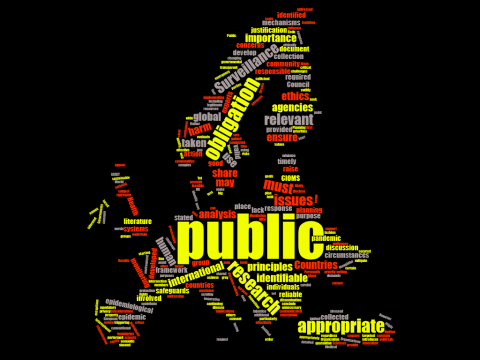Ethical Issues in public health surveillance

“Public health surveillance is the bedrock of outbreak and epidemic response”. With these words, Marie-Paule Kieny – WHO Assistant Director-General for Health Systems and Innovation – introduces the WHO guidelines on ethical issues in public health surveillance, a document targeted to a wide range of stakeholders involved in the constant monitoring of health threats.
Surveillance is not only about infectious diseases but, more generally, it may help to promote human well-being at the population level. Yet surveillance has ignited some controversies, for it may raise important ethical issues. For instance, it can raise concerns about privacy, discrimination and stigmatization, as well as triggering mandatory quarantine, isolation, or seizure of property during an epidemic.
In the past, the World Health Organization has often stressed the importance of ethical principles in pandemic influenza planning and response, and provided a framework of detailed ethical considerations to be addressed, regardless of conventional boundaries. However, a semantic analysis performed by ASSET experts showed little concern for ethical aspects and a lack of discussion on ethical issues in most pandemic plans developed from European countries, with few exceptions.
In 1991, The Council for International Organizations of Medical Sciences (CIOMS) acknowledged the importance of the principles of research ethics first set out in the Nuremberg Code but recognized that application in the epidemiological context would require flexibility. Neither the 2009 revision of CIOMS guidelines nor the ethical framework provided by the Nuffield Council on Bioethics in the United Kingdom faced the problem of how to distinguish surveillance from research on human subjects. Drawing such a line is not easy, but it is clearly necessary when facing public health crises on a global scale.
In order to fill such a gap in international guidelines and to address the ethics of public health surveillance, WHO entrusted an international group of experts in surveillance, epidemiological research, bioethics, public health ethics and human rights, with the development of ethical guidelines. Following a systematic literature review of relevant research and grey literature in accordance with the WHO Handbook for Guideline Development, the committee identified four ethical principles of particular importance for public health surveillance: common good, equity, respect for persons and good governance.
Starting from such a backbone, they then developed 17 guidelines that, as stated in the document, “seek to highlight trade-offs that must be carefully and routinely weighed. They do not provide concrete definitions, measures, precise surveillance parameters or oversight mechanisms that might, on the surface, appear to make decision-making less complex.”
- Countries have an obligation to develop appropriate, feasible, sustainable public health surveillance systems. Surveillance systems should have a clear purpose and a plan for data collection, analysis, use and dissemination based on relevant public health priorities.
- Countries have an obligation to develop appropriate, effective mechanisms to ensure ethical surveillance.
- Surveillance data should be collected only for a legitimate public health purpose.
- Countries have an obligation to ensure that the data collected are of sufficient quality, including being timely, reliable and valid, to achieve public health goals.
- Planning for public health surveillance should be guided by transparent governmental priority-setting.
- The global community has an obligation to support countries that lack adequate resources to undertake surveillance.
- The values and concerns of communities should be taken into account in planning, implementing and using data from surveillance.
- Those responsible for surveillance should identify, evaluate, minimize and disclose risks for harm before surveillance is conducted. Monitoring for harm should be continuous, and, when any is identified, appropriate action should be taken to mitigate it.
- Surveillance of individuals or groups who are particularly susceptible to disease, harm or injustice is critical and demands careful scrutiny to avoid the imposition of unnecessary additional burdens.
- Governments and others who hold surveillance data must ensure that identifiable data are appropriately secured.
- Under certain circumstances, the collection of names or identifiable data is justified.
- Individuals have an obligation to contribute to surveillance when reliable, valid, complete data sets are required and relevant protection is in place. Under these circumstances, informed consent is not ethically required.
- Results of surveillance must be effectively communicated to relevant target audiences.
- With appropriate safeguards and justification, those responsible for public health surveillance have an obligation to share data with other national and international public health agencies.
- During a public health emergency, it is imperative that all parties involved in surveillance share data in a timely fashion.
- With appropriate justification and safeguards, public health agencies may use or share surveillance data for research purposes.
- Personally identifiable surveillance data should not be shared with agencies that are likely to use them to take action against individuals or for uses unrelated to public health.
As stated above, these guidelines are not prescription. Rather, they represent a starting point for a thoughtful discussion about public health surveillance and its ethical implications. As the members of the WHO group conclude, “While these guidelines are a place to start in addressing issues at the intersection of surveillance and big data, the challenges of this swiftly changing environment should be subject to continuing analysis and ethical monitoring. This challenge must be taken up by the global community.”
